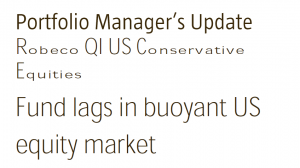On December 2, 2009, Harbor Funds launched six new offerings, including four overtly “conservative equities” funds. Those funds are:
- Harbor Robeco US Conservative Equities
- Harbor Robeco International Conservative Equities
- Harbor Robeco Global Conservative Equities
- Harbor Robeco EM Conservative Equities
All four are being advised by a team from Robeco, a global asset manager that was launched in Rotterdam just after the 1929 stock market crash. Robeco is a portmanteau of the firm’s original name, Rotterdamsch Beleggings Consortium (the Rotterdam Investment Consortium). The firm now manages over $220 billion, with nearly $150 billion of that in ESG-integrated assets. They’ve incorporated ESG factors into their investment strategies since the 1990s.
The “conservative equities” story
Investors have always been taught that the only way to earn returns higher than a savings account is to accept a type of risk – short-term volatility – that’s higher than a savings account; the higher the return you seek, the greater the risk you must inevitably endure.
In equity investing, the level of risk is hard for new investors to imagine, much less endure. Over the course of the current market cycle (from the peak of the previous bull market in October 2007, through the brutal bear market that lasted until March 2009, to now), the average domestic large-cap core fund – the heart of most long-term portfolios – saw a maximum loss of 49%, and it stayed in the red for four years. Investors in international (-54%, 87 months to recover) and emerging markets (-63%, 90 months to recover) saw worse.
That’s not ideal. No one needs to lie awake at night worrying about their portfolio.
Robeco and others observe, though, that not all stocks are equally volatile and that it’s possible to identify stocks with consistently below-average volatility as your investable universe; that is, the starting point from which you construct a portfolio.
Robeco believes there’s a way out of the risk-return relationship. Pim van Vliet, Head of Conservative Equities at Robeco and one of the managers of the Conservative Equities funds argues that
The Robeco Conservative Equities strategy benefits from a revolutionary paradox: risk and return do not go hand in hand. The scientific evidence for this is the basis for our investment philosophy.
The classic risk/reward theory says that to gain greater rewards, you must assume higher risks. But research shows that investing in low-volatility stocks, which tend not be the focus of aggressive stock pickers making big bets for big gains, can offer superior risk-adjusted returns. As investor bias leads many to overpay for high-risk stocks, low volatility stocks may offer better protection in down markets, and achieve market-like gains in up markets
And, indeed, that very dynamic has played out in the markets. We compared the performance of the “regular” S&P 500 with its minimum volatility subset. The comparison period is the full market cycle, so that incorporates both the grinding bear market (10/2007 – 3/2009) and the historically long bull (4/2009 – present). That gives a fairer sense of performance than merely grabbing a five- or ten-year run which captures mostly a period of relentless market gains.
| Annual returns | Maximum drawdown | Sharpe ratio | |
| S&P 500 | 8.3% | -50.9% | 0.51 |
| S&P 500 Minimum Volatility | 8.9 | -43.1 | 0.69 |
Predictably, that combination of higher gains and smaller losses has not gone unnoticed. A screen at MFO Premium for the word “volatility” turns up 26 indexes and 90 funds or ETFs in their names. It’s an area in which funds and ETFs are about equally successful when measured by Sharpe Ratio.
Robeco believes that many of the existing funds are too simple-minded. They simply and mechanically invest in just one factor, low volatility, while ignoring all of the other factors (or variables) that influence long-term stock performance. Examples of such factors include size, quality, dividends, valuations, and momentum. By building those factors into their models, Robeco believes they can generate a more sustainable low volatility / conservative equity advantage. Pim van Vliet:
Unlike generic low volatility index funds or ETFs, Robeco’s active Conservative Equity model includes critical factors like valuation and momentum. This helps to avoid the low-volatility stocks that are too expensive or are trending downward, which in turn reduces both risk and expenses.
You could think of this as “smart low vol” investing or “conservative low vol” investing. At least measured by the performance of the firm’s European products, that conservativism comes at a price: short-term performance lags both the broad market and their low-vol peers, both of which are getting bid up by anxious investors, though long-term performance remains strong.
Many investors might benefit from exploiting the low volatility anomaly. It is, along with long/short investing, absolute value investing and stock-light investing, among the strategies which promise to capture more of the market’s upside than its downside, offering a smoother ride to near-market returns.
All four Harbor Robeco funds are managed by the same four-person team with the same quantitative discipline, though in different investment universes. The minimum initial investment for Investor class shares is $2,500 and the expense ratio, after waivers, is 0.80%. For Institutional shares, the numbers are $100,000 and 0.43%. The fund’s website is straightforward and readable. Robeco has pretty extensive discussions of its Conservative Equities strategy which it also deploys in funds for European investors and accounts for high net worth individuals. Robeco also has reported on the version of the strategy offered to European investors, with a curiously engaging Portfolio Manager’s Update (11/2019) that begins:

I mean, really, how many management teams would splash that all over the cover of their letter?













